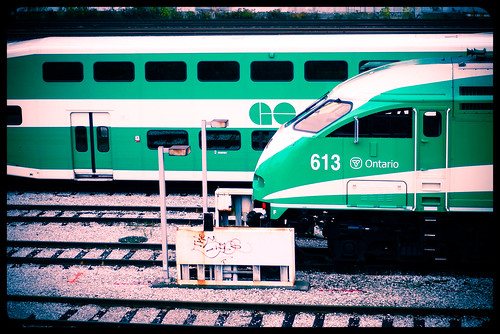
At lunchtime today, the Metrolinx Board of Directors unanimously gave the thumbs up to the GO Transit Electrification Study Community Advisory Committee‘s recommendations for the scope of work in a study of electrification of the entire GO rail system. It is expected that a request for proposals will be issued this month, with the study to be completed by December 2010.
When asked about what was expected to be found in this study, that hadn’t been uncovered in the past, Gary McNeil, Managing Director of GO and Executive Vice President of Metrolinx, said “the studies that were done by GO Transit in the past really looked at the basic operating and capital costs associated with electrifying primarily the Lakeshore Line […] whereas now we’re looking at a significant increase in these corridors [and] we think both the benefits side and the impact side associated with either electrifying or diesel has more then just a cost association with it.”
The terms of reference for the potential consulting firms has asked them to “specifically give some advice on whether there are any emerging technologies that deserve long term attention,” says Daniel Burns, Chair of the Community Advisory Committee. According to McNeil, “the real question is how much benefit do you get and how much does that benefit cost us […] where do you get the best bang for your bucks.”
However, Keith Brooks, of the Clean Train Coalition, argues this has all been done before. He says that, in a previous Metrolinx study, “they also looked at the cost-benefit factors, and electrified service was the clear winner,” and he doesn’t know “why they need to study again, when that study clearly indicated this is the best economic case, not to mention all the environmental and health impacts and the community impacts.”
Although the study will look at broader issues of alternative modes of power for the trains, it is the timeline that most concerns many public stakeholders. Brooks, and other members of the Clean Train Coalition, seem to be frustrated by the delay, stating “it puts them in a wait and see” position. Once the study has been completed and implementation begins, the plan is for a gradual increase in service and Metrolinx would not be running any new trains until the infrastructure is complete in around 2015 and even then this is a 25 year plus into the future project. When asked if he would have done anything differently, McNeil stated, “I wish in 1972 that the province had decided to electrify the Lakeshore Line.” Hopefully it is not another 37 years before things change for rail travel in the GTA, as this is the right time to have progressive thinking and make good decisions on alternative technologies.
Photo by Aubrey Arenas




18 comments
Board members are really bored members.
Study after study…….
Electric GOOD Fossil Fuels BAD
Pay Now, save later.
Oh so tired of hearing the same old excuses from people living in the 20th century.
Step up Toronto.
Board members are really bored members.
Study after study…….
Electric GOOD Fossil Fuels BAD
Pay Now, save later.
Oh so tired of hearing the same old excuses from people living in the 20th century.
Step up Toronto.
carbon footprint (diesel),
or radioactive disposal nightmare (electric),
hmmm…. bio-diesel…. hmmmm
not enough contract funding diversion if it is biodiesel?
politics and science get pretty complex sometimes.
Why is it that McNeil says, I wish they had electrified the lakeshore line 30 years ago, yet when they have the opportunity do so (with the recent decision on the Georgetown line) they don’t take it? Why does no one have the foresight to say, wow, we’re making the wrong decision? Let’s hope Metrolinx/GO get this study right. Diesel trains are not the answer. I’m hoping next year they’ll go “It was stupid to think that running all these diesel trains through densely populated was a good idea” and electrify the Georgetown line immediately. Or come up with a better solution. When health and environment are involved there should only be one decision.
Canada, land of the most majestic of God’s creatures: the never ending herds of studies commissioned on perennially stalled ideas.
managing nuclear power and the waste from it is a huge environmental and health issue.
already 90% of our electricity is nuclear and we have completely stopped looking at what that means.
planning new electrical infrastructure without considering the source of that power is an unclear social initiative.
I prefer clean and quiet. fresh and new. but I can’t remember when I heard anything good about nuclear waste disposal.
Jerry, do you have a source for “90% of our electricity is nuclear”? The parliamentary document here – http://www2.parl.gc.ca/Content/LOP/ResearchPublications/prb0534-e.html – shows it’s about 36% (10 882 MW out of a total capacity of 30 114 MW in 2005.)
The issue of nuclear waste vs fossil fuel burning is a very complex one, and not one that GO Transit should consider. We elect governments to do that; we can’t rely on their arm’s-length transit agency to try and set energy policy in a roundabout way.
Moreover, you cannot reasonably raise that question without ALSO asking “where do you get your diesel? Is it coming from the tar sands in Alberta? Nigeria?” I’m not convinced the by-products (physical AND social) are categorically worse for nuclear power than oil.
@Jerry: Are you talking to yourself?
Here’s two good things. Nuclear waste can be a) put back in the same uranium mines it came from in the first place b) recycled in breeder reactors.
Also, your number is too high by almost half. Only 50% of Ontario’s electricity is nuclear-generated:
http://www.opg.com/power/nuclear/
Jerry: According to the Ontario Power Authority, about 36% of our electricity comes from nuclear (http://www.powerauthority.on.ca/planning/Page.asp?PageID=1290&ContentID=666&SiteNodeID=141&BL_ExpandID=246). Do you have a source for your 90%? I don’t think there’s anyplace on earth that gets 90% of its electricity from nuclear.
Yep, here we go again with the same old anti-nuke bullshit.
Like I said before at a similar discussion on another website, the only way we’re going to be able to have an electric train system is with nuclear power providing the juice along with wind. That’s how France likely does it with the TGV, and how we will likely have to do it here too. But nooo, everybody want wind power, and only wind power, because Norway does it, and Sweden does it, and Finland does it, so we have to do it!
Why can’t we come up with a made-in-Ontario solution to the power problem?
Here’s all you need for the “study”: Determine which are the top ten cities in North America and Europe for rail transit. (Or, pick the top five for North America). Then see what percentage of their systems is electric or diesel. Go with the majority. End of study.
As a quick guess, for N. Am. I would say to look at New York, Chicago, Boston, Philly, DC and maybe SF/Caltrain as a bonus. I think there is a pretty heady mix of diesel and electric in there but the point is to study what has worked elsewhere rather than rethink everything all the time.
Metrolinx; a 1909 plan for 2009.
Nobody ever asks about the carbon footprint and additional pollution of diesel. Even on the most base level I would rather create atomic waste which can be managed than fill the air with toxic pollution that we cant do anything about after it is released.
The airport train should be electrified as well, not just Go Transit. Electrification is a no-brainer on the Georgetown line and airport connection because of the concentration of rail services will be very high.
One question though: can electrification result in quieter trains? Noise is an important factor as well for the health of the surrounding communities.
Electric trains are quieter …they are lighter and they create less wear on the rails which means lower maintenance. The more you look the less sense diesel makes. Vancouver figured it out, why not Metrolinx?
mea culpa
I should have re-reviewed my anti-nuclear facts.
I was just going on table talk with an energy consultant from 2 years ago.
It was a very casual talk and I can’t name names.
He was also really not too concerned about nuclear waste, and I do know it gets repackaged and reburied, and is inspected all the way down the line (we do know that inspectors always catch everything – right?) and then it is left for future generations to figure out a better alternative, or for an earthquake to release the goodies during our lifetimes.
(traditionally things that we bury or return to the earth go into a natural cycle, but burial does not mean a natural cycle has been achieved)
Anyway at this dinner with the maven of energy,
I was very enthusiastic about wind power, but apparently the only dependable source in our area is nuclear, wind being capricious, and never up to the demand, and no storage is available for electricity generated when it is not needed (including atomic).
I agree that the carbon footprint is a serious matter, and that diesel is terrible in that way.
Electric trains appeal to me on many levels. but atomic energy is only a no-brainer because we are encouraged not to think about it.
Who thinks about the half life of nuclear waste, and how safe its disposal might be; and why is that question not considered at more opportunities?
especially when it might be weighed against another “secondary” impact for a related infrastructure, like carbon footprint.
I bring it up because we do not yet have extensive wind or hydrogen power, but when we do, electric trains will be the best and cleanest.
do I think too much, or badly? sorry
I think the power-source question is moot; even the dirtiest coal or gas plant will produce less carbon than a diesel train to push the same number of train cars. A fixed power plant is FAR more efficient than a mobile engine, period.
“Who thinks about the half life of nuclear waste, and how safe its disposal might be; and why is that question not considered at more opportunities?”
My father spend most of his carrier at the Whiteshell Nuclear Laboratories where he and hundreds of other people studied the disposal of nuclear waste in the Canadian Shield. He works on simulations that predict how water would move through the rock over tens to hundreads of thousands of years.
“Vancouver figured it out” – I guess that’s why their MAINLINE service, West Coast Express, uses exactly the same diesel equipment as GO, scottd?
Their METRO service, Canada Line, compares to subway/LRT since it is segregated from freight.
There are good reasons to support electrification – it doesn’t need the help of false statements.